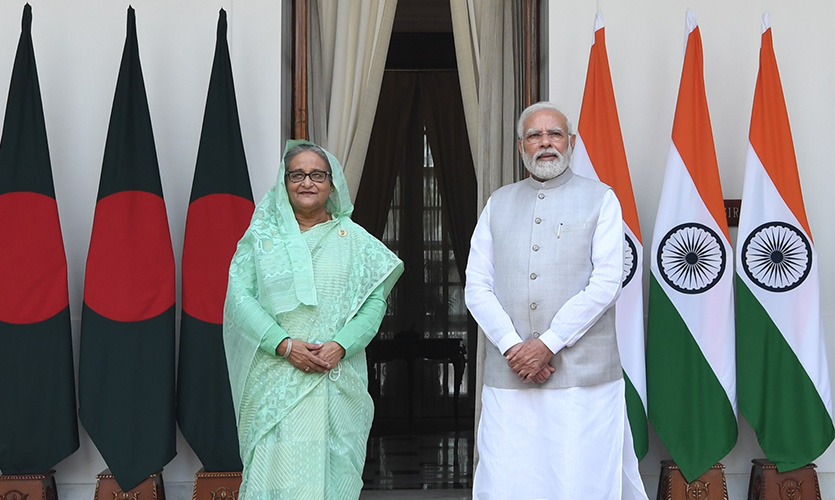During her visit to India, Bangladesh Prime Minister Sheikh Hasina reportedly discussed the issue of Rohingya refugees in the two countries, with PM Narendra Modi. As per reports, the Bangladesh PM expects a solution to the influx of Rohingya refugees migrating into the country through bilateral talks between India and Myanmar.
During an interview with the news agency ANI, PM Hasina stated that the increase in the migration of Rohingya Muslims to Bangladesh is a “big burden” on the country, and that the refugees are a huge threat to its security.
Referring to the issue, she said, “India is a big country. It can do a lot.” In response to this, India only said that it supports the efforts of the Bangladeshi government to ensure safe passage to the Rohingya refugees.
Rohingya Issue In Bangladesh
The migration issue dates back to August 2017, when armed conflict in the state of Myanmar forced thousands of Rohingya Muslims to leave their homes and take shelter in the neighbouring country of Bangladesh.
While some refugees walked through dense jungles for several days to reach safer places in Bangladesh, some others had to cross the dangerous route of the Bay of Bengal.
Data suggests that approximately 900,000 people have taken shelter in the Cox’s Bazar region of Bangladesh. The city now serves as the world’s largest refugee camp. According to the United Nations, Rohingya Muslims are the most persecuted community in the entire world.
Who Are The Rohingyas?
Rohingyas are a Muslim ethnic minority group that are mostly found in the Buddhist majority Myanmar, i.e., erstwhile Burma.
The community continues to live in Myanmar, however, they are still not accepted as an official ethnic group belonging to the country. The Myanmar government has not provided them with citizenship since 1982, making the Rohingyas the largest stateless population in the whole world. With no country to belong to, the community is deprived of basic human rights, protection, and faces a lot of exploitation, and sexual and gender-based violations.
While the community has been facing such heinous exploitation for several decades, its largest exodus was seen in 2017. An increased number of violent attacks in Myanmar’s Rakhine state forced around 900,000 people to leave their homes and seek refuge in Bangladesh. As per reports that surfaced initially, entire villages of the Rohingya Muslim community were burnt, thousands of families were killed or separated, and there were reports of many severe human rights violations.
Condition of Rohingya in Bangladesh
Bangladesh itself is a very small country struggling with its own issues such as poverty and lack of development. Accepting 900,000 refugees for such a small country has to be toiling.
The country has to deal with heavy rainfall due to the monsoon every year. The rains last from June to October, and cause heavy rainfall and floods in the region.
Since the refugee camps in Cox’s Bazar are not made from pakka house materials, the refugees have to manage in clumsy shelters of bamboo and tarp. Moreover, the camps are situated in areas prone to landslides, and are not made to withstand the strong winds and heavy rainfall in the region.
The rainy season also accompanies many diseases due to clogged water and filth. Diseases like hepatitis, malaria, dengue and chikungunya present huge risks to the lives of children living in such conditions. Furthermore, crowded camps do not have proper sanitation and water facilities, which poses a serious threat towards the well-being of children and the elderly.
Bangladesh PM Asks India To Talk To Myanmar Regarding Repatriation
During her visit, Sheikh Hasina urged PM Modi to talk to Myanmar’s military junta so that the refugees living in adverse conditions can be resettled in their homeland.
“India is a vast country… You can accommodate, but you don’t have much (many refugees). But in our country… We have 1.1 million Rohingya. We are consulting with the international community and also our neighbouring countries. They should also take some steps so that they can go back home,” said the Bangladesh PM.
She further added:
“As long as we are in power, we always give importance to the well-being of minority Hindus and I always tell them that you are a citizen of this country. You should own this country. But some incidents sometimes take place. However, we take immediate actions. Yet sometimes it happens. It is an unwanted situation but you know very well that it is not limited to just Bangladesh. Even in India sometimes the minorities suffer. So I think that both the countries should show their magnanimity… On our part, Bangladesh is a secular country, we have many religions, religious harmony. So, when one or two incidents happen, especially my part, my priority is to safeguard them and my people are very conscious regarding that. Our government takes immediate actions, but it has to be from both sides of the border. There should be more cooperation with each other.”










